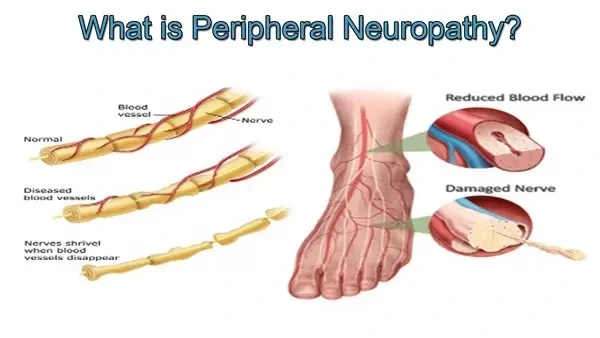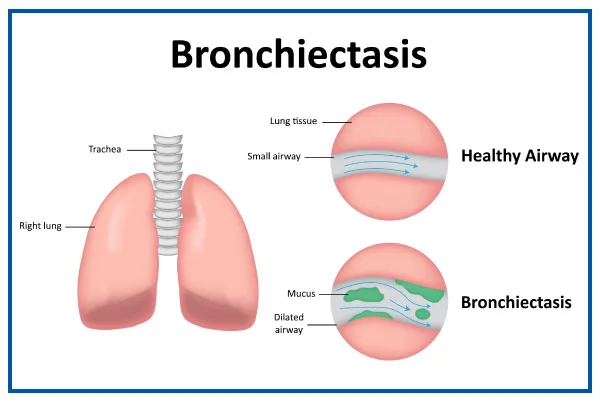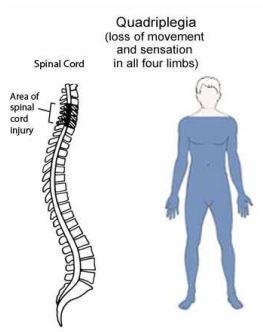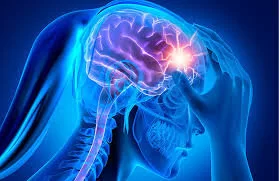Peripheral Neuropathy
Table of Contents
What is Peripheral Neuropathy?
- Peripheral neuropathy is a neurological disorder in which damage to the peripheral nerves (located outside of the brain and spinal cord) which causes weakness, pain, and numbness, normally in the upper & lower extremity (hands and feet).
- It can also affect other areas and body functions involving ing urination, circulation, and digestion.
- Your peripheral nervous system sends information from your brain and central nervous system to the rest of your body.
- The peripheral nerves also send sensory information to the CNS (central nervous system).
- Peripheral neuropathy can result from traumatic injuries, infections, metabolic problems, and exposure to toxins.
- One of the very common causes is diabetes.
- Peripheral neuropathy generally describes the pain as stabbing, burning, or tingling.
- Medicins can reduce peripheral neuropathy pain.
- In many other cases, symptoms improve, especially if caused by a treatable condition.
Examples of peripheral neuropathy include:
- Postherpetic Neuralgia: Follow shingles and last for more months after the rash disappears
- Ulnar Nerve Palsy: After an injury to the elbow.
- Carpal Tunnel Syndrome: This is the Compression of the nerves in the wrist.
- Peroneal Nerve Palsy: This is caused by compression of the fibular nerve in the leg.
- Bell’s palsy: This is a single-nerve neuropathy that affects the face.
Causes of Peripheral Neuropathy
Peripheral neuropathy is nerve damage caused by different conditions. Medical conditions that can cause peripheral neuropathy include:
- Autoimmune diseases: These include Sjogren’s syndrome, Guillain-Barre syndrome, rheumatoid arthritis, lupus, chronic inflammatory demyelinating polyneuropathy, and vasculitis.
- Diabetes: This is a very common cause. whom people with diabetes, more than half will develop a few types of neuropathy.
- Infections: These include bacterial infections or certain viral, including shingles, Epstein-Barr virus, hepatitis B and C, Lyme disease, leprosy, diphtheria, and HIV.
- Inherited disorders: Disorders such as Charcot-Marie-Tooth disease are inbred types of neuropathy.
- Tumors: Growths, malignant (cancerous) and noncancerous (benign), can develop on the nerves or press on nerves. Also, polyneuropathy can arise as a result of a few cancers related to the body’s immune response. This is a degenerative disorder called paraneoplastic syndrome.
- Bone marrow disorders: These include an abnormal protein in the blood, lymphoma, a form of bone cancer, and the rare disease amyloidosis.
- Other diseases: These include connective tissue disorders, liver disease, kidney disease, and an underactive thyroid (hypothyroidism).
Other causes of neuropathies include:
- Alcoholism: Poor dietary choices who people with alcoholism can lead to vitamin deficiencies.
- Exposure to poisons: Toxic substances include heavy metals and industrial chemicals such as lead and mercury.
- Medications: Certain medications, especially those used for chemotherapy (treat cancer), can cause peripheral neuropathy.
- Injury or pressure on the nerve: Injuries, such as from falls or sports injuries, and motor vehicle accidents, can sever or damage peripheral nerves. Nerve pressure can result from having a cast or using repeating a motion or crutches such as typing many times.
- Vitamin deficiencies: B vitamins including B-1, B-6, B-12 vitamin E, and niacin are crucial to nerve health.
Signs & Symptoms of Peripheral Neuropathy
Every nerve in your peripheral system has a specific function, therefore symptoms depend on the type of nerves affected. Nerves are classified into:
- Sensory nerves that receive sensation, similar to temperature, pain, vibration, or touch, from the skin
- Motor nerves that control muscle movement
- Autonomic nerves that control functions similar to blood pressure, perspiration, heart rate, digestion, and bladder function
Signs & symptoms of peripheral neuropathy might include:
- Gradual onset of numbness, prickling, or tingling in the upper & lower extremity(hands and feet), which can spread upward into your legs and arms
- Sharp, jabbing, throbbing, or burning pain
- Extreme sensitivity to touch
- Pain during activities that shouldn’t cause pain, such as pain in your feet when putting weight on them or when they’re under a blanket
- Lack of coordination and falling
- Muscle weakness
- Feeling as if you’re wearing gloves when you’re not
- Paralysis if motor nerves are affected
Signs and symptoms of autonomic nerves affected may include:
- Heat intolerance
- Excessive sweating or not being capable to sweat
- Bowel, bladder, or digestive problems
- Decreasing blood pressure, causing dizziness or lightheadedness
- Peripheral neuropathy can affect mononeuropathy (one nerve), two or more nerves in different areas (multiple mononeuropathies), or many nerves (polyneuropathy). Carpal tunnel syndrome is an example of mononeuropathy (one nerve). Most common people with peripheral neuropathy have polyneuropathy.
Risk factors
Peripheral neuropathy risk factors include:
- Diabetes, specifically if your sugar levels are poorly controlled
- Alcohol misuse
- Vitamin deficiencies, particularly B vitamins
- Infections, such as Lyme disease, Epstein-Barr virus, hepatitis B and C, and HIV
- Autoimmune diseases, suchlike as rheumatoid arthritis and lupus, in which your immune system attacks your own tissues
- Kidney, liver, or thyroid disorders
- Exposure to toxins
- Repetitive motions, such as those performed for certain jobs
- Family history of neuropathy
Complications
Complications of peripheral neuropathy can include:
- Burns and skin injuries: You may not feel temperature changes or pain in parts of your body that are numb.
- Infection: Your feet and another area lacking sensation can become injured without your knowing. Check this area regularly and treat minor injuries before they become infected, specifically if you have diabetes.
- Falls: Weakness and loss of sensation might be associated with a lack of balance and falling.
Diagnosis
Peripheral neuropathy has many potential causes. Besides a physical exam, which might include blood tests, diagnosis usually requires:
- A full medical history: Your medical history, including your symptoms, lifestyle, exposure to toxins, drinking habits, and a family history of nervous system (neurological) diseases.
- Neurological examination: Your doctor may check your tendon reflexes, your muscle strength and tone, your ability to feel some sensations, and your posture and coordination.
Tests
Your doctor might order tests, including:
- Blood tests: These can detect vitamin deficiencies, diabetes, abnormal immune function, and other suggestions of conditions that can cause peripheral neuropathy.
- Imaging tests: CT or MRI scans can look for herniated disks, compressed nerves, tumors, or other abnormalities affecting the blood vessels and bones.
- Nerve function tests: Electromyography (EMG) reports electrical activity in your muscles to detect nerve damage. A thin electrode is fitted into the muscle to measure electrical activity as you contract the muscle.
- At the same time, your doctor or an EMG technician obtains an electromyogram and generally performs a nerve conduction study. Flat electrodes are placed on the skin and low electricity stimulates the nerves. Your doctor will note your nerves’ responses to the electric current.
- Other nerve function tests: These might include an autonomic reflex screen that notes how the autonomic nerve fibers work, a sweat test that measures your body’s capability to sweat, and sensory tests that mark how you feel touch, vibration, cooling, and heat.
- Nerve biopsy: This involves removing a slight portion of a nerve, generally a sensory nerve, to look for abnormalities.
- Skin biopsy: Your doctor removes a small portion of the skin to look for a reduction in nerve endings.
Treatment of Peripheral Neuropathy
- Treatment aims are to manage the condition causing your neuropathy and to relieve symptoms. If your lab tests indicate no underlying condition, your doctor might recommend awake waiting to see if your neuropathy improves.
Medications
Besides drugs used to treat conditions associated with peripheral neuropathy, Drugs used to relieve peripheral neuropathy signs and symptoms include:
- Pain relievers: Over-the-counter pain drugs, such as nonsteroidal anti-inflammatory drugs, can relieve mild symptoms. For more-severe symptoms, your doctor may prescribe painkillers. Medications containing opioids, such as tramadol (Conzip, Ultram, others) or oxycodone (Oxycontin, Roxicodone, others), can lead to dependence and addiction, so these drugs usually are not prescribed unless all other treatments fail.
- Anti-seizure medications: Medications such as gabapentin (Gralise, Neurontin, Horizant) and pregabalin (Lyrica), developed to treat epilepsy, might relieve nerve pain. Side effects can involve dizziness and drowsiness.
- Topical treatments: Capsaicin cream, which contains a substance found in hot peppers, can cause medium improvements in peripheral neuropathy symptoms. You may have skin burning and irritation when you apply the cream, but this commonly lessens over time. few people, however, can’t tolerate it. Lidocaine patches are other treatments you apply to your skin that may offer pain relief. Side effects can include numbness, dizziness, and drowsiness at the site of the patch.
- Antidepressants: Certain tricyclic antidepressants, suchlike as amitriptyline, doxepin (Silenor, Zonalon), and nortriptyline (Pamelor), have been found to help relieve pain by interfering with chemical processes in your brain and spinal cord that cause you to feel pain. The serotonin and norepinephrine reuptake inhibitor duloxetine (Cymbalta, Drizalma Sprinkle) and the extended-release antidepressants venlafaxine (Effexor XR) and desvenlafaxine (Pristiq) also may ease the pain of peripheral neuropathy caused by diabetes.
Side effects of antidepressants might include dry mouth, nausea, drowsiness, dizziness, changes in appetite, weight gain, and constipation.
Therapies
Many therapies and procedures may help ease the signs and symptoms of peripheral neuropathy.
- Transcutaneous electrical nerve stimulation (TENS): Electrodes placed on the skin deliver a gentle electric current at differing frequencies. TENS should be applied for 10-15 minutes daily for about a month.
- Plasma exchange and intravenous immune globulin: These processes, which help suppress immune system activity, may benefit people with certain inflammatory conditions. Plasma exchange involves removing your blood, then removing antibodies and another protein from the blood and returning the blood to your body. In immune globulin therapy, you take high levels of proteins that work as antibodies.
- Physical therapy: If you have muscle weakness, physical therapy can support improving your movements. You might also require hand or foot braces, a cane, a walker, or a wheelchair.
- Surgery: If you have neuropathies caused by pressure on nerves, suchlike as pressure from tumors, you may need surgery to reduce the pressure.
Physiotherapy treatment in Peripheral Neuropathy
The main role of Physiotherapy is to
- Maintaining muscle strength, and preventing muscle deformity and shortening
- Balance, coordination, and functional training.
- Pain relief e.g. provision of TENS, massage
- Splints as needed, prevent deformity and contractures
- Education, preventing damage,re-managing conditions, and emotional support.
Alternative medicine
Few people with peripheral neuropathy try complementary treatments for relief. Although researchers haven’t studied these techniques as completely as they have most medications, the following therapies have shown few promises:
- Acupuncture: Inserting thin needles into various points of your body may reduce peripheral neuropathy symptoms. You may need many sessions before you notice improvement. Acupuncture is normally considered safe when performed by a certified practitioner using sterile needles.
- Alpha-lipoic acid: This has been used as a treatment for peripheral neuropathy in Europe for periods. Discuss operating alpha-lipoic acid with your doctor because it can affect blood sugar levels. Side effects can involve skin rash and stomach upset.
- Herbs: Certain herbs, suchlike as evening primrose oil, might help reduce neuropathy pain in people with diabetes. Some herbs interact with medications, so discuss the herbs you’re considering with your doctor.
- Amino acids: Amino acids, suchlike as acetyl-L-carnitine, might benefit people who have undergone chemotherapy and people with diabetes. Side effects might include vomiting and nausea.
Lifestyle and home remedies
To help you manage peripheral neuropathy:
- Take care of your feet, specifically if you have diabetes: Check daily for blisters, cuts, or calluses. cloths soft, loose cotton socks, and padded shoes. You can use a semicircular band, which is available in medical supply stores, to keep bedcovers off hot or sensitive feet.
- Exercise: Regular exercise, suchlike as walking three times a week, can reduce neuropathy pain, improve muscle strength and help control blood sugar levels: Gentle routines suchlike as yoga and tai chi may also help.
- Quit smoking: Cigarette smoking can affect circulation, increasing the danger of foot problems and other neuropathy complications.
- Eat healthy meals: Good nutrition is specifically important to ensure that you get essential vitamins and minerals. Including vegetables, fruits, lean protein, and whole grains in your diet.
- Avoid alcohol: Alcohol can worsen peripheral neuropathy.
- Monitor your blood glucose levels: If you have diabetes, this will assist keep your blood glucose under control and might help improve your neuropathy.
Prevention
Manage underlying conditions
- The best way to prevent peripheral neuropathy is to manage medical conditions that put you at risk, suchlike as diabetes, alcoholism, or rheumatoid arthritis.
Make healthy lifestyle choices
These habits support your nerve health:
- Eat a diet of fruits, vegetables, whole grains, and lean protein to keep your nerves healthy: Protect against vitamin B-12 deficiency by eating fish, eggs, meats, low-fat dairy foods, and fortified cereals. If you’re vegetarian or vegan, fortified cereals are a good source of vitamin B-12, but your doctor talks about B-12 supplements.
- Exercise regularly: Try to get at least 30 minutes to 2 hours of exercise at least three times a week.
- Avoid factors that might cause nerve damage: Including repetitive motions, cramped positions that put pressure on nerves, exposure to toxic chemicals, smoking, and overindulging in alcohol.
FAQ
Peripheral neuropathy can result from traumatic injuries, infections, inherited causes, metabolic problems, and exposure to toxins. The very common cause is diabetes. People with peripheral neuropathy normally describe the pain as stabbing, burning, or tingling.
Still, you may be at risk of developing potentially serious complications, suchlike as a foot ulcer that becomes infected, If the underlying cause of peripheral neuropathy isn’t treated. This can lead to gangrene if untreated, and in severe cases might mean the affected foot has to be amputated.
There are many more different ways that peripheral neuropathy can happen, so this condition is common. For some people, peripheral neuropathy is temporary, treatable, or both. For others, it’s permanent and incurable.
Neuropathy’s first stage is Numbness and Pain.
Regular exercise, as well as walking three times a week, can improve muscle strength, reduce neuropathy pain, and help control blood sugar levels. Gentle routines as well as yoga and tai chi may also help Quit smoking.
The main medicines recommended for neuropathic pain include amitriptyline also used for the treatment of headaches and depression. duloxetine is alike used for the treatment of bladder problems and depression. pregabalin and gabapentin are alike used to treat epilepsy, headaches, or anxiety.
Intraneural Facilitation (INF) treatment effectively restores blood flow to damaged nerves, reducing pain caused by diabetic peripheral neuropathy(DPN).
Whether or not neuropathy can depend on the cause of the nerve damage. In a few cases, the pain may go decrease entirely. In others, nerve damage may be permanent. For example, when neuropathy is caused by an infection, symptoms may go away fully when the infection is treated.
Walking can reduce the pain and other symptoms of neuropathy from nerve damage in your feet and lower legs. Walking and other light aerobic exercises have many benefits for people affected by neuropathy, which is a wide range of conditions including disease and damage to the peripheral nerves
Living with pain and discomfort can be challenging. People with neuropathy are at high risk for depression and anxiety than those without a neurological complaint. The good news is treatable, and a pain specialist can help.






11 Comments